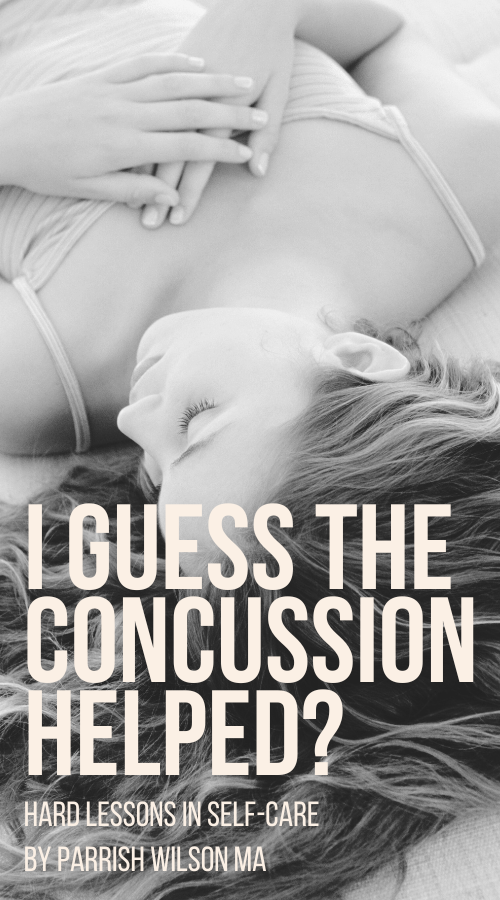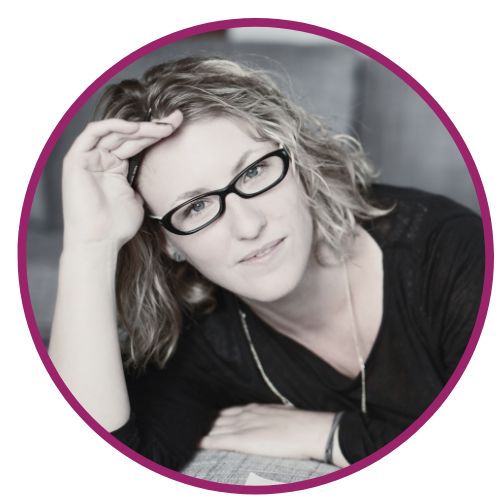 Facebook Memories tells me it’s been 16 years since I fell rock climbing in Costa Rica, resulting in a few stitches in my head and a serious concussion that went undiagnosed for years leading to multiple chronic health issues.
Facebook Memories tells me it’s been 16 years since I fell rock climbing in Costa Rica, resulting in a few stitches in my head and a serious concussion that went undiagnosed for years leading to multiple chronic health issues.
When my babies were babies, I hurt everyday. There were many days I couldn’t carry them. I had wanted to be a baby-wearer but sharp pains shot through my shoulders whenever I tried.
My first was almost three years old, and my second was just a few months, when finally the diagnosis came. I was in physio, as I had been so often the previous few years, with two physiotherapists working on me to try to stabilize my body without me getting dizzy. Finally one of them, the founder of the clinic, asked me “Have you ever fallen?”
The fall had happened 4.5 years before that question was asked.
I was sport climbing outside Cartago, in the Central Valley of Costa Rica where my father has lived since I was a kid. I was on lead, and caught up trying to be the cool chick who didn’t wear a helmet like all the other “cool” (aka stupid) guys I was climbing with that day.
I had made it up the first section of the climb with relative ease, clipping my rope into the bolts as I went, confident in my ability. For those not familiar with climbing, being “on lead” means you’re bringing the rope up with you, it’s not already hanging there, so essentially your closest tie point to the rock wall is often below you where you last clipped in.
I was past the last bolt, just trying to figure out how to get a good enough hand hold to clip into the anchor. I couldn’t find the hold, so I climbed back down to my last bolt and took a rest. Looked at the problem. Tried to see what I couldn’t see.
I climbed up again, once again above my last bolt, but couldn’t figure it out and climbed back down to the bolt to rest and look some more.
I don’t know how many times I did this, wasting energy and strength climbing up and down this stretch of 9 feet of vertical rock at the top of this climb.
Finally I went up again, my feet well above the bolt, and tried my best to clip into the anchor. But this time my arms couldn’t try anymore. I hadn’t found the hold that would allow me to clip into the anchor with ease. My body was exhausted. I fell.
It was probably 15 feet. I didn’t fall well, something I had struggled to learn as a climber. I didn’t put my hands out in front of me and at the bottom of the fall, my helmet-free head smashed into the rock wall.
I didn’t even realize what had happened. I thought I was going to try the climb again. I didn’t want to look like a failure in front of these guys. But there was another climber on the wall beside me and he told me I was bleeding. I put my hand to my head and felt the sticky blood.
“Ok, let me down,” I called to the hottie belaying me.
A couple years later, before the concussion was diagnosed, I fought my way to the Redpoint on that climb. Apparently the hold you need to clip into the anchor is ABOVE the anchor, something my much taller sweetie at the time found easily. That little bit of info was all I needed, and climb it, I did. With my helmet on, of course.
But the day I fell, no one talked about a possible concussion. I hadn’t lost consciousness so the doctors at the hospital didn’t consider it. No one told me to be careful or take great care of my head. They stitched me up and sent me on my way. They did suggest a helmet in the future.
I flew home to Vancouver the next day, feeling horribly sick throughout the flight and long airport line ups. But I didn’t want to be a wuss so I sucked it up. I didn’t complain.
I went back to climbing the next day. Never took a break. Never rested. “Sleep when you’re dead!” was a popular motto in my house growing up.
I wish I had rested. I wish I had delayed my flight. I wish I’d asked for a wheelchair in the airport. I wish I had rested when I got home. I wish I had been taught to take care of myself.
I wish I had been taught that the cognitive capacity of my brain was more important than what some cute climber guys might think of me.
But I wasn’t taught any of that. I was taught to please others.
And it took a concussion, and over a decade of pain and exhaustion to learn that I’m the one I’m supposed to be pleasing.
It’s ok to say,
“No, I can’t do that.”
“I need to rest.”
“It’s time for me to take care of myself.”
I didn’t know we were allowed to say those things.
These days, 16 years later apparently, I try to honour my needs to rest as best I can with two kids. I don’t push myself for “epic” anything anymore unless it’s an epic cup of tea with an epic book on my couch. I still aspire to be more active but it’s been a long road back for me and these days restorative and hatha yoga keep me pain free.
More and more, through my work in mental health and writing, I believe that for so many of us, what we truly need is ease. Not epic workouts that drain us of all strength, but nourishing opportunities to move and connect with this body of ours. Opportunities to find flow and connect with spirit. Opportunities for us to be thoughtfully ourselves, unimpeded by external pressures to be something else.
My workshops offer that – slowing down, looking within and honouring yourself. My journaling program, Sacred Pages, starts January 22 and the first series of workshops is called Winter: Rest. For in the quiet darkness of the winter months rest is most natural. Rest before growth. Laying the foundation for a beautiful year ahead.
We’ll play with prompts like:
How much do you allow yourself to rest and what does rest look like for you?
What treasures may lie in the quiet of rest, waiting for you to find them?
How can you nourish yourself in the dark winter months, so that you may bloom brightly come Spring?
There is power in rest, don’t let them convince you it’s weak. It took me a concussion and chronic illness to learn that lesson.
In rest there is wisdom, love and magic. Give it a try this winter.

Parrish Wilson is a memoir writer and offers therapeutic writing services, supporting her clients to process life and all it’s complexities through the written word. She holds a Masters of Counselling & Spirituality, focusing her research on healing trauma through autobiographical writing. Check out her upcoming journaling series, Sacred Pages, for guided writing workshops designed to enhance emotional well-being and support a fulfilling 2025.
